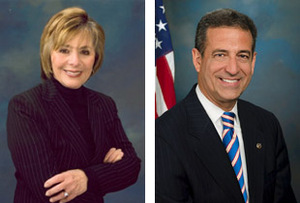
[Photo: Senate Majority Leader Harry Reid (D-Nev.) speaks to reporters after the successful cloture vote on the bill to repeal “Don’t Ask, Don’t Tell” on Dec. 18. With him, from left, are Sen. Mark Udall (D-Colo.), Center for American Progress senior vice president Winnie Stachelberg, Sen. Joseph Lieberman (I-Conn.), former Air Force Major Mike Almy, Servicemembers Legal Defense Network executive director Aubrey Sarvis, Human Rights Campaign president Joe Solmonese and Senate Armed Services Committee chairman Sen. Carl Levin (D-Mich.). (Photo by Chris Geidner.)]
After a stressful month for supporters of repealing “Don’t Ask, Don’t Tell,” today’s successful 65-31 vote for the bill aimed at repealing the law is, for them, quite sweet.
As everyone begins analyzing (or spouting off, to put it less gracefully), though, here are 13 “fun facts” about today’s final roll call vote for passage of the DADT repeal bill to put it in context against the scene in 1993, when this policy became law. (And, don’t worry, I’ll have some more traditional analysis/spouting on Sunday!)
The facts:
- Twenty-nine senators who voted in 1993 on the bill that brought DADT to life — the Conference Report on the National Defense Authorization Act (NDAA) for Fiscal Year 1994* — also voted today on the repeal bill.
- Only three senators who voted against the NDAA in 1993 also voted to end DADT today: Sens. Barbara Boxer (D-Calif.), Russ Feingold (D-Wisc.) and Arlen Specter — who was a Republican in 1993 — (D-Pa.). (But, there’s a caveat with Specter, explained below.)
- Five senators who voted for the NDAA in 1993, though, voted to keep DADT today: Sens. Bob Bennett (R-Utah), Kit Bond (R-Mo.), Thad Cochran (R-Miss.), Charles Grassley (R-Iowa) and Richard Lugar (R-Ind.).
- Sen. John McCain (R-Ariz.) — that stalwart defender of all that is DADT — didn’t vote for the NDAA that put DADT into place, although he voted today to keep it in place. He was joined in this feat by … no one. Sen. Orrin Hatch (R-Utah), who did not cast a vote today, had — like McCain — voted against the NDAA conference report in 1993.
 Earlier in 1993, Boxer had attempted to remove DADT from the NDAA by replacing it with language leaving the decision about the policy “concerning homosexuality in the Armed Forces” up to the president. Even on that vote, though, she only found support from a third of the Senate. Fourteen of the 32 who joined her then in attempting to strip DADT from the NDAA joined her again today in repealing the law.
Earlier in 1993, Boxer had attempted to remove DADT from the NDAA by replacing it with language leaving the decision about the policy “concerning homosexuality in the Armed Forces” up to the president. Even on that vote, though, she only found support from a third of the Senate. Fourteen of the 32 who joined her then in attempting to strip DADT from the NDAA joined her again today in repealing the law.- Although they voted against the conference report, both McCain and Hatch let their support for DADT to be known by voting against the Boxer amendment, as did all five of the Republicans who opposed repeal today and voted for the NDAA in 1993.
- Also voting against Boxer’s amendment: Specter — making Boxer and Feingold the only two senators to vote against DADT at every stage in its history.
- Then-Sen. Harry Reid (D-Nev.) and five other Democrats voted for repeal today but voted against the Boxer amendment — and hence for DADT — in 1993: Sens. Max Baucus (D-Mont.), Kent Conrad (D-N.D.), Byron Dorgan (D-N.D.), Herb Kohl (D-Wisc.) and John “Jay” Rockefeller (D-W.V.). All of them but Dorgan voted for the NDAA conference report in 1993 as well. (Dorgan was “not voting.”)
- Of the Democrats who voted to repeal DADT today, 17 had voted for the original NDAA bringing DADT to life. Also in that category: then-Democrat Sen. Joseph Lieberman (I-Conn.). Of those 18, though, 13 — including Lieberman and Sen. Carl Levin (D-Mich.) — earlier had voted for Boxer’s amendment to strip DADT from the 1993 bill. The other 11: Sens. Daniel Akaka (D-Hawaii), Jeff Bingaman (D-N.M.), Chris Dodd (D-Conn.), Dianne Feinstein (D-Calif.), Tom Harkin (D-Iowa), Daniel Inouye (D-Hawaii), John Kerry (D-Mass.), Frank Lautenberg (D-N.J.), Patrick Leahy (D-Vt.), Barbara Mikulski (D-Md.) and Patty Murray (D-Wash.).
- Of the eight Republicans to vote to repeal DADT today, none were in the Senate when it was enacted.
- Only three Republicans — one of whom later left the party — voted for the Boxer amendment in 1993: Sens. John Chafee (R-R.I.), Alfonse D’Amato (R-N.Y.) and then-Republican James Jeffords (I-Vt.). All three represented a state where the state’s other senator voted for the Boxer amendment as well.
- Every Republican to vote to repeal DADT today comes from a state where the state’s other senator also voted for repeal. Of the eight Republicans to vote for repeal, six represent a state in which the other senator is a Democrat who supported repeal by voting “yes” on both failed cloture votes on the NDAA this year, voting “yes” on cloture on the stand-alone bill today and voting “yes” for final passage of the repeal bill today. The other two represent Maine — and both voted “yes” on cloture and for final passage today.
- Only seven states had split delegations today, in which one senator voted “yes” and one voted “no”: Florida, Indiana, Iowa, Louisiana, Missouri, Nebraska and South Dakota. All had one Democratic senator voting “yes” and one Republican senator voting “no.”
* = Of course, there were other reasons for supporting or opposing the NDAA, but — the point remains — the roll call vote to which I am referring was the final vote in the Senate to send the NDAA to President Bill Clinton’s desk with DADT as a provision in it.
[CORRECTION: As pointed out in comments, I had incorrectly identified an extra “split delegation” state. Idaho, of course, had no senator supporting repeal. The error has been corrected.]























